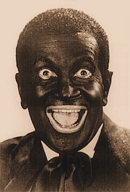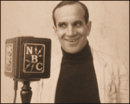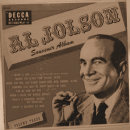Here we bring you Al Jolson, (May 26, 1886 – October 23, 1950) who was an American singer, comedian and actor. In his heyday, he was dubbed "The World's Greatest Entertainer". He was born in Russia (now Lithuania) and came to America at the age of 5 with his Jewish parents.
His performing style was brash and extroverted, and he popularized a large number of songs that benefited from his "shamelessly sentimental, melodramatic approach". Numerous well-known singers were influenced by his music, including Bing Crosby Judy Garland, rock and country entertainer Jerry Lee Lewis, and Bob Dylan, who once referred to him as "somebody whose life I can feel". Broadway critic Gilbert Seldes compared him to "the Great God Pan,"
claiming that Jolson represented "the concentration of our national health and gaiety."
In the 1930s, he was America's most famous and highest paid entertainer. Between 1911 and 1928, Jolson had nine sell-out Winter Garden shows in a row, more than 80 hit records, and 16 national and international tours.
(May 26, 1886 – October 23, 1950) who was an American singer, comedian and actor. In his heyday, he was dubbed "The World's Greatest Entertainer". He was born in Russia (now Lithuania) and came to America at the age of 5 with his Jewish parents.
His performing style was brash and extroverted, and he popularized a large number of songs that benefited from his "shamelessly sentimental, melodramatic approach". Numerous well-known singers were influenced by his music, including Bing Crosby Judy Garland, rock and country entertainer Jerry Lee Lewis, and Bob Dylan, who once referred to him as "somebody whose life I can feel". Broadway critic Gilbert Seldes compared him to "the Great God Pan,"
claiming that Jolson represented "the concentration of our national health and gaiety."
In the 1930s, he was America's most famous and highest paid entertainer. Between 1911 and 1928, Jolson had nine sell-out Winter Garden shows in a row, more than 80 hit records, and 16 national and international tours.
Although he's best remembered today as the star in the first (full length) talking movie, The Jazz Singer, in 1927. He later starred in a series of successful musical films throughout the 1930s. After a period of inactivity, his stardom
returned with the 1946 Oscar-winning biographical film, The Jolson Story. Larry Parks  played Jolson with the songs dubbed in with Jolson's real voice.
played Jolson with the songs dubbed in with Jolson's real voice.
A sequel, Jolson Sings Again, was released in 1949, and was nominated for three Oscars. After the attack on Pearl Harbor, Jolson became the first star to entertain troops overseas during World War II, and again in 1950 became the first star to perform for G.I.s in Korea, doing 42 shows in 16 days. He died just weeks after returning to the U.S., partly due to the physical exertion of
performing. Defense Secretary George Marshall afterward awarded the Medal of Merit to Jolson's family.
According to the St. James Encyclopedia of Popular Culture, "Jolson was to jazz, blues, and ragtime what Elvis Presley was to rock 'n' roll". Being the first popular singer to make a spectacular "event" out of singing a song, he became a "rock star" before the dawn of rock music. His specialty was building stage runways extending out into the audience. He would run up and down the runway and across the stage, "teasing, cajoling, and thrilling the audience",
often stopping to sing to individual members, all the while the "perspiration would be pouring from his face, and the entire audience would get caught up in the ecstasy of his performance".
According to music historian Larry Stempel, "No one had heard anything quite like it before on Broadway." Author Stephen Banfield agrees, writing that Jolson's style was "arguably the single most important factor in defining the modern musical . . ."
He enjoyed performing in blackface makeup – a theatrical convention since the mid-19th century. With his unique and dynamic style of singing black music, like jazz and blues, he was later credited with single-handedly introducing African-American music to white audiences. As early as 1911 he became known for fighting against anti-black discrimination on Broadway. Jolson's well-known theatrics and his promotion of equality on Broadway helped pave the way for
many black performers, playwrights,  and songwriters, including Cab Calloway, Louis Armstrong, Duke Ellington, Fats Waller, and Ethel Waters.
Jolson's legacy has suffered enormously since the 1960s.
and songwriters, including Cab Calloway, Louis Armstrong, Duke Ellington, Fats Waller, and Ethel Waters.
Jolson's legacy has suffered enormously since the 1960s.
Few under the age of 50 even know his name, and those who do were taught that he was a "white man who made millions making fun of black people." This is, of course, not true. In fact, blackface had long lost its negative racial implications by the turn of the century and became a convention of theater. Many stars, including Eddie Cantor, Fred Astaire, Bing Crosby, Judy Garland, Doris Day, Betty Grable
and many black stars of the time, used blackface. There was no bigotry attached to it.
So the man who was the king of Broadway for nearly 40 years is now largely forgotten or misunderstood, and there is no plaque, statue or sign anywhere on Broadway to honor him.
Now let's hear Al Jolson !
Just click on a link to listen!
Al Jolson
- BobHope 470408
- Chesterfield 500104 Al Jolson
- Chesterfield 500104 with guest Al Jolson
- Chesterfield 500215 Al Jolson
- Chesterfield 500215 guest Al Jolson
- Chesterfield 500503 Ella Fitzgerald Al Jolson
- Chesterfield 500503 Guest Al Jolson
- Chesterfield 491103 Al Jolson
- Chesterfield 491228 Al Jolson
- ColgateShow 430330 fragment
- EddieCantor 370103 With Al Jolson And Diana Durbin
- EddieCantor 470306 How Eddie Cantor And Al Jolson Got Started
- EddieCantor 470306 With Al Jolson
- EddieCantor 490107 Visiting Al Jolson
- HeresToVeterans 1446 Jolson
- JimmyDuranteShow 480121
- JoanDavisShow 500120
- KateSmithHour 391229 fragment
- KraftMusicHall 471002 Edgar Bergen Charlie McCarthy
- KraftMusicHall 471016 Bing Crosby
- KraftMusicHall 471023 Groucho Marx
- KraftMusicHall 471106 Humphrey Bogart
- KraftMusicHall 471127 Dorothy Lamour
- KraftMusicHall 471204 Red Skelton
- KraftMusicHall 471218 with Jimmy Durante
- KraftMusicHall 471225 with Boris Karloff
- KraftMusicHall 480101 with Madeline Carroll
- KraftMusicHall 480108 with William Powell
- KraftMusicHall 480212 Charles Laughton
- KraftMusicHall 480304 Cary Grant
- KraftMusicHall 480325 Clifton Webb
- KraftMusicHall 480415 Charles Boyer
- KraftMusicHall 480506 Groucho Tries Selling Anything To Al
- KraftMusicHall 480520 Henry Morgan
- KraftMusicHall 481104 Al Jolson with Burns And Allen
- KraftMusicHall 481118 A Quiz For Jolson-Groucho Marx
- KraftMusicHall 481202 Peggy Lee
- KraftMusicHall 481209 Dennis Day
- KraftMusicHall 481216 Dinah Shore
- KraftMusicHall 481223 Kraft Choral Club
- KraftMusicHall 481230 Doris Day
- KraftMusicHall 490106 Larry Parks
- KraftMusicHall 490113 A Mink For Jolson-Groucho Marx
- KraftMusicHall 490113 Groucho Marx
- KraftMusicHall 490120 Victor Moore
- KraftMusicHall 490127 Arthur Treacher
- KraftMusicHall 490203 Dennis Day
- KraftMusicHall 490210 Peggy Lee
- KraftMusicHall 490217 Joan Davis
- KraftMusicHall 490224 The Andrews Sisters
- KraftMusicHall 490303 Dorothy Kirsten
- KraftMusicHall 490310 Jimmy Durante
- KraftMusicHall 490317 Roy Rogers Dale Evans
- KraftMusicHall 490324 George Jessel
- KraftMusicHall 490407 A Baseball Team For Jolson-Groucho Marx
- KraftMusicHall 490407 Groucho Marx
- KraftMusicHall 490414 Margaret Whiting
- KraftMusicHall 490428 Doris Day
- KraftMusicHall 490505 Dennis Day
- KraftMusicHall 490512 Victor Moore
- KraftMusicHall 490519 Dorothy Kirsten
- KraftMusicHall 490526 A Laundry For Jolson-Groucho Marx
- KraftMusicHall 490526 Groucho Marx
- KraftMusicHall 491021 Jimmy Durante
- KraftMusicHall William Bendix
- LuxRadioTheater 36-06-15 Burlesque
- LuxRadioTheater 450402 Swannee River
- LuxRadioTheater 470602 Jazz Singer
- LuxRadioTheater 480216 Jolson Story
- LuxRadioTheater 500522 Jolson sings again
- Operation Dawn 490522
To listen online, just click on the link of the show you want to hear and it will open in the proper media player on your computer for standard.mp3 files. You can also right-click on the link and choose "Save As," then upload the file to your mobile device for listening later. No special software is needed so you can listen to these old time radio shows online for FREE!